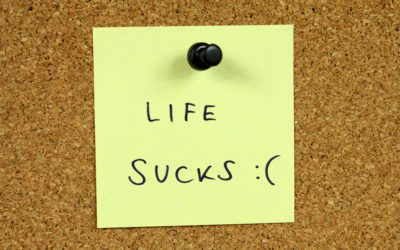In part one of this series, I shared a bit about what I call “the big nothing” – the space within us where we connect most easily with the deeper, creative Mind which is the source of everything new which comes into being. (If you missed it, you can read it here.)
Today, I want to talk about “the bit in the middle” – the bit between getting an idea for a great new song and winning a Grammy, between seeing someone you fancy and having grandchildren, and between embarking on any new creation and enjoying the fruits of your labors.
There is a cartoon by Sidney Harris which speaks beautifully to the gap between where we are when we start on a creative project and where we wind up at its successful completion:

Yet often times, what looks like a “miracle” or an “overnight success” to an outsider is just the fruit of showing up and putting in the work, the eponymous 10,000 hours that masters of their craft have often put in behind the scenes before their output even comes to our attention. Not understanding that creating often involves putting in far more hours than we think we should have to causes numerous would be creators from giving up when the going gets tough, assuming that if famous bands can write famous songs in less than an hour, taking more than a week to write the next great novel or more than a year for your business idea to prove itself successful must mean that you’re not really cut out for this kind of thing or your on the wrong track.
Some people are extremely disciplined about doing the work- see Steven Pressfield’s The War of Art or the British author W. Somerset Maugham, who said “I only write when inspiration strikes. Fortunately it strikes every morning at 9am sharp.”
In her brilliant TED talk, “Your Elusive Creative Genius” , Elizabeth Gilbert shares the story of the poet Ruth Stone who took a more “catch as catch can” approach. She would “feel and hear a poem coming at her from over the landscape…. like a thunderous train of air…” and run like hell to grab a pen and paper “fast enough so that when it thundered through her, she could collect it and grab it on the page.” Others take an even more extreme approach, waking up at 2am on holiday with an idea for a new business or leaving everything until the last minute so they can have the thrill of scrambling to meet a deadline just before all seems to be lost.
But whatever their approach – fast or slow, disciplined or eclectic, inspired by love and passion or fueled by drugs, alcohol, or the need to pay the rent – anyone I’ve ever met with a high creative output has figured out somewhere along the line that the best way to do good work is to do lots of it.
This needn’t be bad news – the creative process is filled with actual miracles and the joy of watching something new come into the world that didn’t exist before you created it is a pleasure unlike nearly any other I have known in my 40+ years on the planet. But if you really want to create, at some point your going to have to do what creators do – show up each day to your keyboard, easel, workbench, or boardroom – and do the work.
Next week, I’ll conclude this series by writing about the energy of completion and how we can harness it to fuel our future creative endeavors. But I’d like to finish this week with one of my favorite quotes author/producer Ira Glass:
“Nobody tells this to people who are beginners, I wish someone told me. All of us who do creative work, we get into it because we have good taste. But there is this gap. For the first couple years you make stuff, it’s just not that good. It’s trying to be good, it has potential, but it’s not. But your taste, the thing that got you into the game, is still killer. And your taste is why your work disappoints you. A lot of people never get past this phase, they quit. Most people I know who do interesting, creative work went through years of this. We know our work doesn’t have this special thing that we want it to have. We all go through this. And if you are just starting out or you are still in this phase, you gotta know its normal and the most important thing you can do is do a lot of work. Put yourself on a deadline so that every week you will finish one story. It is only by going through a volume of work that you will close that gap, and your work will be as good as your ambitions. And I took longer to figure out how to do this than anyone I’ve ever met. It’s gonna take awhile. It’s normal to take awhile. You’ve just gotta fight your way through.”
With all my love,
![]()










